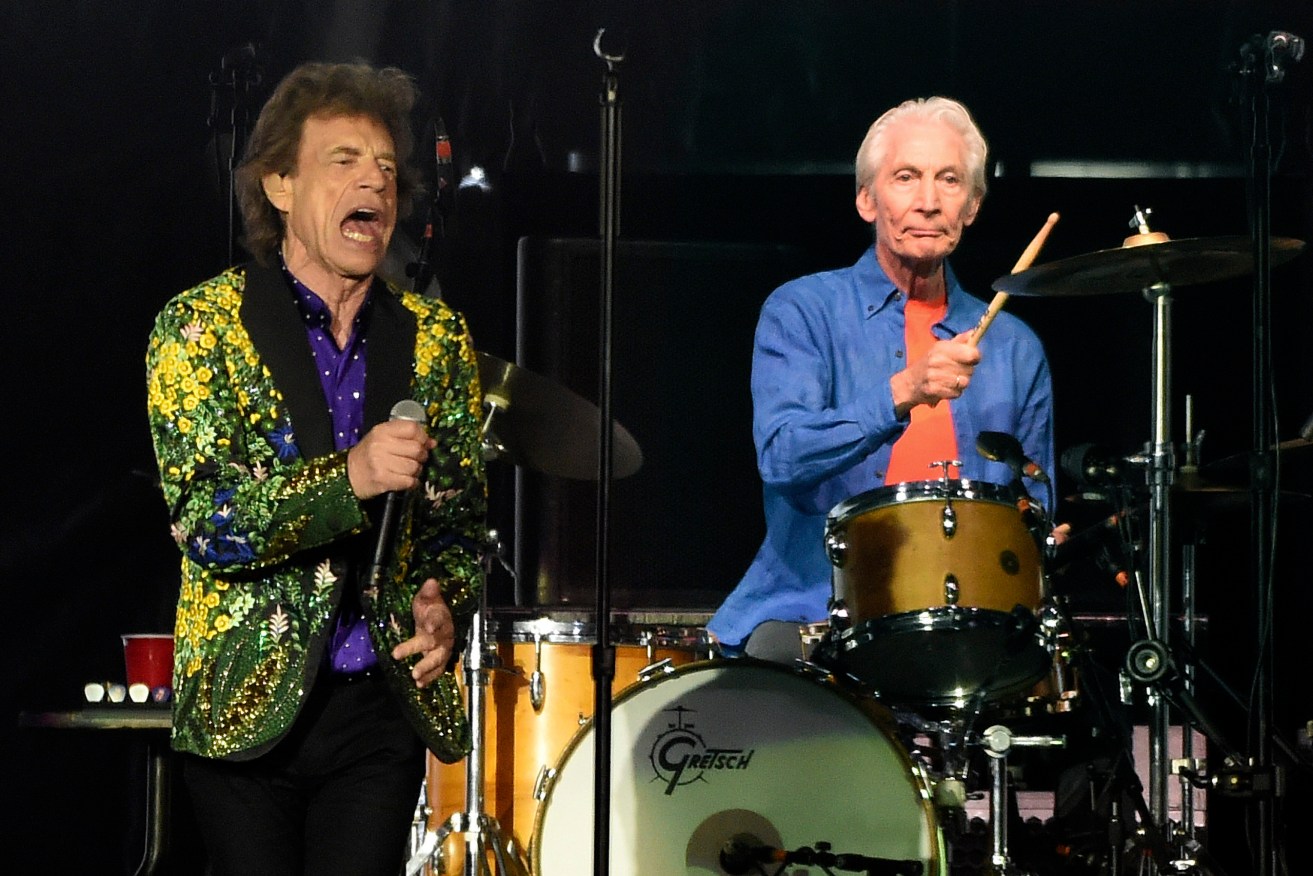A rock among the Stones: Watts makes an elegant departure from spotlight
Charlie Watts, the self-effacing and unshakeable Rolling Stones drummer who helped anchor one of rock’s greatest rhythm sections and used his “day job” to support his enduring love of jazz, has died at age 80.

FILE - Rolling Stones drummer Charlie Watts, right, performs behind singer Mick Jagger during their concert at the Rose Bowl, Thursday, Aug. 22, 2019, in Pasadena, Calif. Watts died in London today at age 80. (AP Photo/Chris Pizzello, File)
Watts “passed away peacefully in a London hospital earlier today surrounded by his family”, his publicist Bernard Doherty said.
“Charlie was a cherished husband, father and grandfather and also as a member of The Rolling Stones one of the greatest drummers of his generation,” Doherty said on Tuesday.
Watts had announced he would not tour with the Stones in 2021 because of a health issue.
The quiet, elegantly dressed Watts was often ranked with the likes of Keith Moon and Ginger Baker as a premier rock drummer, respected for his muscular, swinging style. He joined the Stones in early 1963 and remained for nearly 60 years, ranking just behind Mick Jagger and Keith Richards as the group’s longest-lasting and most essential member.
Watts largely held himself apart through the drug abuse, creative clashes and ego wars that helped kill founding member Brian Jones, drove bassist Bill Wyman and Jones’ replacement Mick Taylor to quit and otherwise made being in the Stones a most exhausting job.
A classic Stones song such as Brown Sugar and Start Me Up often began with a hard guitar riff from Richards, with Watts following closely behind, and Wyman, as the bassist liked to say, “fattening the sound”. The documentary Shine a Light showcased Watts’ speed, power and timekeeping when director Martin Scorsese filmed Jumpin’ Jack Flash from where he drummed towards the back of the stage.
The Stones began, Watts said, “as white blokes from England playing black American music” but quickly evolved their own sound. Watts was a jazz drummer and never lost his affinity for the music he first loved, heading his own jazz band and taking on numerous other side projects.
He had his eccentricities – Watts collected cars even though he didn’t drive – but he was a steadying influence as the Stones defied all expectations by rocking well into their 70s, decades longer than their old rivals The Beatles.
He was a rock star, but Watts said the actual experience was draining, unpleasant and even frightening. “Girls chasing you down the street, screaming … horrible! … I hated it,” he told The Guardian. In another interview, he described the drumming life as a “cross between being an athlete and a total nervous wreck”.
Watts found refuge by marrying Shirley Ann Shepherd in 1964 and having a daughter, Seraphina. While other rock marriages crumbled, theirs held. Jagger and Richards could only envy their bandmate’s indifference to stardom and relative contentment in his private life, which included tending horses on an estate in Devon, England.
Charles Robert Watts, son of a truck driver and a homemaker, was born in Neasden, London, on June 2, 1941. From childhood, he was passionate about music – jazz in particular. He fell in love with the drums after hearing Chico Hamilton, and taught himself to play by listening to records by giants such as Charlie Parker and Duke Ellington.
He worked for an advertising firm after attending London’s Harrow Art College and played drums in his spare time. London was home to a blues and jazz revival in the early 1960s, with Jagger, Richards and Eric Clapton among the future superstars getting their start. Watts’ career took off after he played with Alexis Korner’s Blues Incorporated, for whom Jagger also performed, and was encouraged by Korner to join the Stones.
Watts wasn’t a rock music fan and Richards and Jones immersed him in blues and rock records, notably the music of bluesman Jimmy Reed. Watts said the band could trace its roots to when he had lost his job and briefly shared an apartment with Jagger and Richards because he could live there rent-free.
Watts was the final man to join the Stones; the band had searched for months to find a permanent drummer and feared Watts was too accomplished for them. Watts said he believed at first the band would be lucky to last a year.
Watts fell into heroin addiction in the mid-1980s. He would credit his stable relationship with his wife for getting him off drugs. “I was warring with myself at that time,” he told Rolling Stone magazine.
Watts indulged his passion for jazz by putting together some of the most talented musicians in Britain for recordings and performances. His first jazz record was the 1986 Live at Fulham Town Hall.
Watts was treated for throat cancer in 2004 and made a full recovery, resuming touring with the Stones and his jazz band.
He is survived by his wife Shirley, sister Linda, daughter Seraphina and granddaughter Charlotte.










